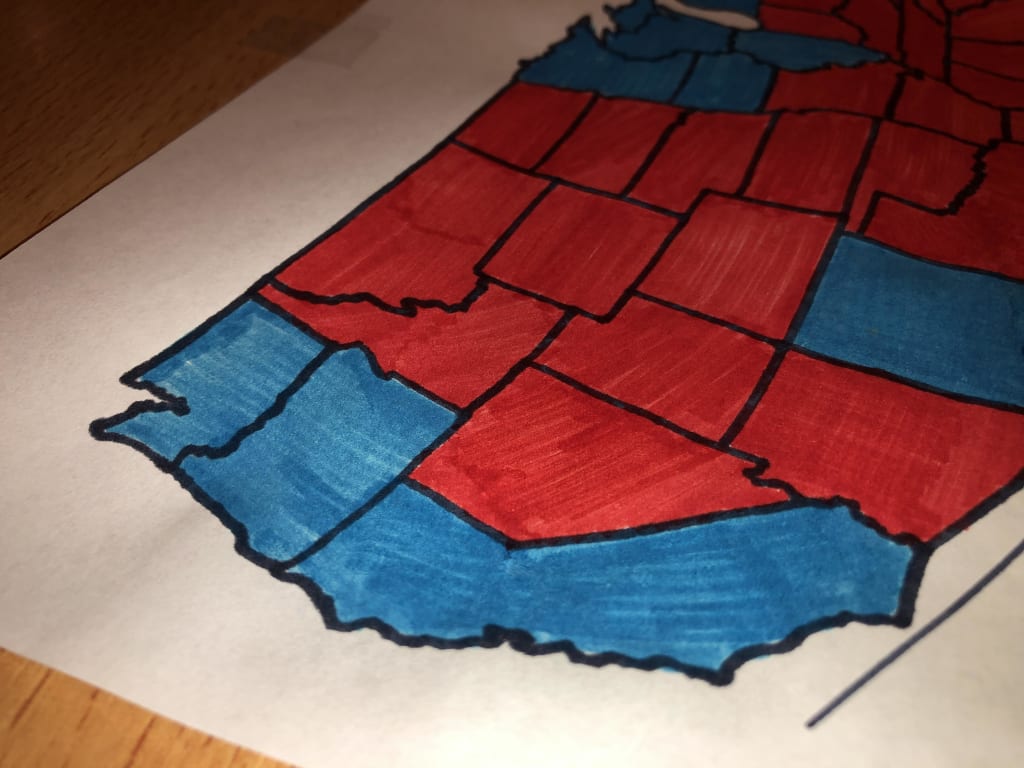Opinion: The Electoral College Must Be Abolished
In 2016, our electoral system failed voters and Hillary Clinton. We cannot let those similar mistakes happen again in 2020.

Every four years since 1789, the Electoral College has been used in electing a new president and vice president. For those of you who may not know what exactly the Electoral College is, it is not a literal college, but a group of electors. Every ten years, the United States government conducts a census, where it tracks the country’s people and economy. The number of electoral votes a state has reflects its population. When the country changes in population, the number of electoral votes in each state is changed. As you watched the 2016 presidential election live, you may have heard newscasters announce each state and its number of electoral votes. That number represents the number of electors in that state. For example, California has 55 electoral votes while New York has 29. On the other hand, large states such as Montana or Nebraska have fewer than five electoral votes. This indicates that the sizes of certain states do not clearly reflect their number of electoral votes. That overall crystallizes the biased approach of the Electoral College in electing a new leader, which makes it necessary for it to be abolished.
To understand the concept of the electing process, it is important to know how it functions. According to The Washington Post, in order for a candidate to be officially elected as president, they would need to surpass 270 electoral votes. Each state, including the District of Columbia, has at least three electoral votes because “a state’s number of electors is identical to the total number of its senators and representatives in Congress.” It all adds up to a total of 538 electoral votes.
Ironically, it is actually the votes of the electors (people appointed by the political parties in their states) that will determine the next president, not the votes of the people (the popular vote). In presidential election history, there have only been four times where the winning candidate won the national popular vote but lost the entire election. First, in 1824, Andrew Jackson won the popular vote but lost the election to John Quincy Adams. Second, in 1876, the most consequential of all presidential elections, Samuel Tilden lost the election despite having had “more popular support” and a narrow vote margin against his opponent, Rutherford B. Hayes. Third, Grover Cleveland won the popular vote from Benjamin Harrison but lost the election in 1888. Fourth, in 2000, one the most controversial elections, Al Gore went against George W. Bush. At the end of the election, Bush and Gore were tied. Gore possessed 266 votes compared to Bush’s 246 votes, neither possessing the 270 votes needed for the win. This issue turned into a case that went all the way to the Supreme Court. The issue involved mismatched vote counts in Florida. After two days of intense vote recounting, the Supreme Court awarded Florida’s 25 electoral votes to Bush, which, as a result, allowed him to be “elected” as the next President. Finally, in the 2016 election, Hillary Clinton won the popular vote against Donald Trump by a million but lost the election to him.
Hillary Clinton, who was the Democratic Party’s nominee in the election, displayed her thoughts on the Electoral College. She said, “I believe strongly that in a democracy, we should respect the will of the people [...] and to me that means it’s time to do away with the Electoral College and move to the popular election of our president.” Her stance, shared by many others, have led local state leaders to present their voices on the issue, such as Jennifer Granholm, a former governor of Michigan. Granholm said, “If we really subscribe to the notion that ‘majority rules,’ then why do we deny the majority of their chosen candidate.” On the other side of the argument, Gary L. Gregg II, Electoral College expert at the University of Louisville, stated that abolishing the system would be a “national nightmare.” Historically, the Electoral College was created “to ensure that residents in states with smaller populations were not ignored.” Although the system that is used to this day brings many advantages to certain states, its purpose has and is still being taken advantage of. Electors were appointed in their states to “make intelligent choices” for average Americans who “would lack enough information.”
The Electoral College shows that it represents each state fairly, but it does not fulfill the purpose it was created for. As the Huffington Post explains, the Electoral College has made “the value of each citizen’s vote different from that of someone living in another state.” Additionally, this signifies that the distribution of electoral votes per state is not equally dispersed. The Electoral College’s objective when it was first created was to make the states feel equally represented in a federalist government. As Jonathan Mahler and Steve Eder explain in their article “The Electoral College Is Hated By Many,” “The Electoral College is a relic that violates the democratic principles of one person, one vote, and distorts the presidential campaign by encouraging candidates to campaign only in the relatively small number of contested states.”
In order for the Electoral College to be abolished, however, a constitutional amendment is required. Now that the country has a divided Congress, with a Republican-controlled Senate and a Democratic-controlled House of Representatives, an amendment is likely---if we choose to act on it. But on the other hand, instead of completely abolishing the Electoral College, future presidential elections can turn to the National Popular Vote Interstate Compact. As Tyler Lewis, a journalist from Huffington Post, states in his article, “when we vote for President we would actually be voting for President, not instructing ‘electors’ on how we want them to vote.”
The Electoral College is an unfair and skewed system that does not represent citizens’ votes in presidential elections. Now that its flaws have been revealed four times in modern United States history, and possibly a fifth time in this year’s election, it defeats the purpose to “equally” represent people’s voices. The system’s unfair and inaccurate representation of how many people voted for a particular candidate has urged people to call for its abolition. In the near future, the United States government will hopefully allow elections to adopt the popular vote. With the popular vote, the elections would present accurate and unbiased data in each state and a candidate’s total number of votes he or she gains. Although the Electoral College is a significant part of the United States government and its history, its abolition should be accounted for and looked upon by the people and the government of the United States.
About the Creator
Thomas Jang
Alongside majoring in Environmental Studies, I love expressing my thoughts on films and TV, environment-related issues, urban landscapes, to architecture.






Comments
There are no comments for this story
Be the first to respond and start the conversation.